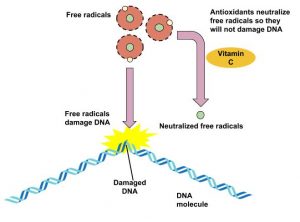Antioxidants
The market is flooded with advertisements for “super ” supplements teeming with molecules that block free radical production, stimulate the immune system, prevent cancer, and reduce the signs of aging. Based on the antioxidant-supplement industry’s success, the general public appears to believe these . However, these claims are not backed by scientific evidence; rather, there is some evidence suggesting supplements can actually cause harm. While scientists have found evidence supporting the consumption of antioxidant-rich foods as a method of reducing the risk of chronic disease, there is no “miracle cure”; no pill or supplement alone can provide the same benefits as a healthy diet. Remember, it is the combination of antioxidants and other nutrients in healthy foods that is beneficial. In this section, we will review how particular antioxidants function in the body, learn how they work together to protect the body against , and explore the best nutrient-rich dietary sources of antioxidants. One dietary source of antioxidants is vitamins. In our discussion of antioxidant vitamins, we will focus on vitamins E, C, and A.

Image by Allison Calabrese / CC BY 4.0
Antioxidant Chemicals Obtained from the Diet
There are many different antioxidants in food, including selenium, which is one of the major antioxidants. However, the antioxidants you may be the most familiar with are vitamins. The “big three” antioxidants are vitamins E, A, and C, although it may be that they are called the “big three” only because they are the most studied.
| Antioxidant | Antioxidant Source | Antioxidant Function |
|---|---|---|
| Vitamin A | Karat banana, beef liver, chicken liver | Protects cellular membranes, prevents glutathione depletion, maintains free radical detoxifying enzyme systems, reduces inflammation |
| Vitamin E | Sunflower seeds, almonds, sunflower oil | Protects cellular membranes, prevents glutathione depletion |
| Vitamin C | Oranges, grapefruit | Protects DNA, RNA, proteins, and lipids, aids in regenerating vitamin E |
| Vitamin D | Swordfish, salmon, tuna fish canned in water and drained | Regulates blood calcium levels in concert with parathyroid hormone |
| Carotenoids | Pumpkin, carrots | Free radical scavenger |
Learning Activities
Technology Note: The second edition of the Human Nutrition Open Educational Resource (OER) textbook features interactive learning activities. These activities are available in the web-based textbook and not available in the downloadable versions (EPUB, Digital PDF, Print_PDF, or Open Document).
Learning activities may be used across various mobile devices, however, for the best user experience it is strongly recommended that users complete these activities using a desktop or laptop computer.
Compounds that inhibit the oxidation of other substances.
A claim found on food labels that describes the relationship between a nutrient or food and a disease of health condition.
A highly reactive atom or molecule that causes oxidative damage.
Organic compounds that are needed in small amounts in the diet to support and regulate the chemical reactions and processes needed for growth, reproduction, and the maintenance of health.
